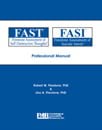
Firestone Assessment of Suicide Intent fasi
For: Screens for suicide intent in ages 16-70 years
Reading Level: Adult - Elder Adult
Format: Paper and Pencil
Length: 5 minutes
Scoring: Hand Scored
Printed Forms & Handscoring Materials
Test forms, response booklets and scoring reference manuals.
FASI Rating Forms/Scoring Summary (25)
Author
Robert W. Firestone, PhD and Lisa A. Firestone, PhD
Description
The FASI is a brief suicide screener that clinicians may administer when they wish to assess only suicide intent. This subset of the FAST consists of 27 items from Levels 7-11 of the FAST. These 27 items, which compose the Suicide Intent Composite of the FAST, are the most predictive of suicide risk.
Special Features
The measure incorporates a unique approach. Instead of asking a client to report beliefs or symptoms he or she is experiencing, the client is asked to endorse how frequently he or she is experiencing self-critical/self-depreciating thoughts in the form of an internal dialogue or voice (i.e., negative thoughts directed toward oneself). Endorsing items in this format allows the client to reflect on and report the contents of his/her negative thought process or voice. When items are presented in this form, they bring to light elements of a self-destructive process that have been partially or completely unconscious.
For both the FAST and FASI, the scale raw scores are summed and normative scores are provided in the form of T scores and percentiles. The FAST contains five composite scores: Self-Defeating, Addictions, Self-Annihilating, Suicide Attempt, and Total Score.
The clinician may use the FAST to stimulate discussion in therapy sessions regarding significant issues in a client’s life that neither the client nor the clinician might have been aware of prior to the administration of the measure. Clients have reported that reading and endorsing the items made them aware of self-limiting and/or self-destructive thoughts that had not previously been part of their conscious awareness. Responses to the measure also alert the clinician to patterns of self-destructive behaviour that need to be investigated.
Reliability and Validity
Internal consistency reliability coefficients for the composite scores that include multiple levels range from .95-.97. The internal consistency estimates for the levels range from .76-.91, with a median alpha of .84. The test-retest correlations range from .63-.94, with an average of .82.
The coefficients for all composites constructed from level scores (i.e. Self-Defeating Composite, Self-Annihilating Composite, Total Score) range from .95-.97.
A number of procedures were implemented to establish the validity of the FAST: (a) expert reviews, (b) factor analytic studies, (c) correlations with other measures of self-destructive thoughts or behaviours, (d) studies of specificity and sensitivity of the test to discriminate a variety of clinical groups, and (e) studies of special clinical groups.
The original 220-item pool for the FAST consisted of verbatim statements made by clients during Voice Therapy groups. The most suicidal voices or thoughts consisted of self-statements reported by individuals who had made serious suicide attempts and who were actively suicidal. The remainder consisted of negative thoughts reported by clients with a variety of patterns of self-destructive behaviour, including substance abuse.
The FAST Total Score had its highest correlations with the Suicide Ideation subscale of the Suicide Probability Scale (SPS; Cull & Gill, 1988; r = .76), the Beck Depression Inventory (BDI), and the Beck Suicide Inventory (BSI). These findings support the contention that the Total Score is a measure of suicide ideation and depression, or the self-destructive thoughts at the highest end of the continuum.
NB: Prices are in Australian dollars inclusive of GST. NZ customers need to log in to view ex-GST prices.



